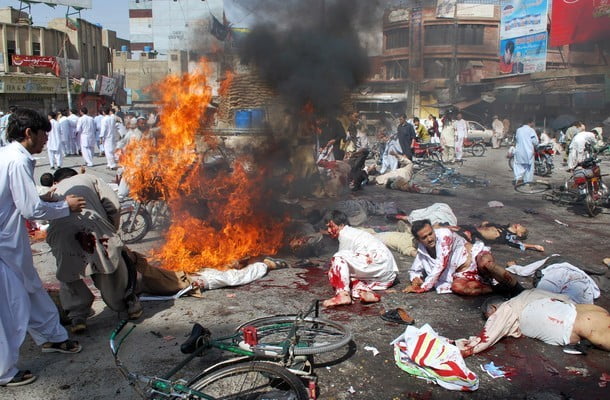
A suicide bomber targeting a political rally in southwest Pakistan Friday killed 128 people, an official said, the deadliest in a string of attacks on campaign events that have raised security fears ahead of nationwide polls.
The blast - which was claimed by the Daesh extremist group - ripped through the crowd in the town of Mastung near the Balochistan provincial capital Quetta, and was the deadliest in Pakistan in more than a year.
It came hours after another bomb killed at least four people at a campaign rally in Bannu in the country's northwest. A third bomb killed 22 people at another rally in Peshawar on Tuesday.
The attacks underscored the fragility of Pakistan's dramatic gains in security after years of steady improvement and widespread optimism that things had turned a corner.
"The death toll has risen to 85," Balochistan health minister Faiz Kakar earlier told AFP, adding that were more than 100 wounded.
According to senior provincial official Saeed Jamali, the bomber detonated in the middle of a compound where a political meeting was taking place. Another senior official, Qaim Lashari, also confirmed it was a suicide blast.
Emergency workers shuttled victims to nearby vehicles from the bombed-out compound as bystanders sobbed in the darkness due to the lack of electricity in the impoverished area.
Victims in blood-smeared clothes were taken to hospitals in Mastung and nearby Quetta, where they were greeted by tense crowds of mourners, an AFP reporter said. The deceased could be seen covered in shrouds.
The explosion killed Siraj Raisani, who was running for a provincial seat with the newly formed Balochistan Awami Party (BAP), provincial home minister Agha Umar Bungalzai told AFP.
"Mir Siraj Raisani succumbed to wounds while he was being shifted to Quetta," he added. Raisani was the younger brother of former provincial chief minister Mir Aslam Raisani.
The attack came hours after four people were killed and 39 injured when a bomb hidden inside a motorcycle detonated near a Pakistani politician's convoy in Bannu on Friday, near border with Afghanistan.
The politician - Akram Khan Durrani, a candidate of the Muttahida Majlis-e-Amal (MMA) party - survived, police said. No group has yet claimed responsibility for that attack.
On Tuesday, a bomb claimed by the Pakistani Taliban targeted a rally by the Awami National Party (ANP) in the city of Peshawar.
Local ANP leader Haroon Bilour was among the 22 killed. Thousands flocked to his funeral the next day.
'Duty to protect'
The Daesh group has a muted presence in Pakistan but has carried out brutal attacks there in the past, including the blast at a Sufi shrine in February last year which killed nearly 90 people.
Militants have targeted politicians, religious gatherings, security forces and even schools in Pakistan.
But security across the country has dramatically improved since government and military operations cleared large swathes of territory near the Afghan border in recent years.
Analysts warn, however, that Pakistan has yet to tackle the root causes of extremism, and militants retain the ability to carry out attacks.
The military has warned of security threats in the run-up to the tense election on July 25, and said it will deploy more than 370,000 soldiers on polling day.
Following the series of attacks this week, activists called for Pakistani authorities to remain vigilant to protect candidates during the final days of the campaign season.
"The Pakistani authorities have a duty to protect the rights of all Pakistanis during this election period - their physical security and their ability to express their political views freely, regardless of which party they belong to," said Omar Waraich, deputy South Asia director at Amnesty International.
Last month, a US air strike killed the leader of the Pakistani Taliban, Maulana Fazlullah, in neighbouring Afghanistan in what the Pakistani army called a "positive development" that also sparked fears of reprisals.





